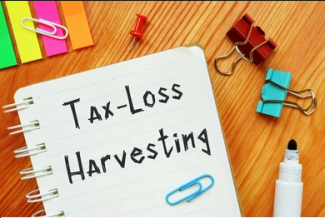
Tax-Loss Harvesting: How Losses Work in Your Favor
Downturns in the stock market can be met with some level of concern. An experienced investor knows the last thing to do would be to sell everything and exit the market. In some instances, however, selling may be beneficial (as counterintuitive as it may sound). This is where tax-loss harvesting comes into the picture.
Tax-Loss Harvesting
The tax-loss harvesting strategy involves selling positions with losses to offset current or future realized gains. Typically, you should replace the original position sold with a similar or alternative investment to avoid wash sale rules (more about wash sale rules in our earlier blog).
One important item to keep in the mind is that tax-loss harvesting can only be implemented in taxable accounts (e.g., brokerage accounts, joint account, trust accounts, etc.). Selling in retirement accounts such as IRAs, 401(k)s, Roth IRAs, etc., are not compatible with this strategy as there is no taxable event when realizing a loss or a gain.
Benefits of Tax-Loss Harvesting
- Minimizing or avoiding capital gain taxes: The most evident benefit is the ability to offset gains realized to reduce or potentially eliminate any capital gains taxes owed for the year. Assuming losses realized are far greater than gains realized for the year, you can take an additional $3,000 maximum capital loss deduction to reduce your overall taxable income. Any remaining losses that have not been used up can be carried forward indefinitely.
- For example, if gains realized for the year were $40,000 and losses were $50,000, the $40,000 gain would be offset, leaving a remaining $10,000 that can be used. Of this $10,000, $3,000 can be used as a deduction, leaving $7,000 that can be used to offset gains in future years.
- Tax Bracket Management: Since this strategy mainly focuses on reducing your tax bill in the short-term, individuals in high tax brackets will especially want to avoid paying capital gains taxes at the highest levels. Even if you are not in a high tax bracket, it may still be worthwhile to take advantage of this strategy now in the event you find yourself in a higher tax bracket later or potentially being on the cusp of the 15% capital gains tax bracket.
- Rebalancing Opportunities: A well-diversified portfolio is bound to have underperforming and outperforming asset classes at any given point. Harvesting losses and using the available cash from the sale(s) can be utilized to efficiently rebalance your portfolio allocation.
Conclusion
There are quite a few considerations to factor in when implementing this strategy. A great example of seeing this strategy work in action is the market downturn of March 2020 when the pandemic selloff first began. While it was a tumultuous time for everyone, this was a great opportunity to harvest losses to offset gains realized towards the end of 2020 and beyond. It is recommended to consult with a fee-only financial advisor to setup a proper tax-loss harvesting strategy that fits your portfolio allocation and financial goals.
Weingarten Associates is an independent, fee-only Registered Investment Advisor in Lawrenceville, New Jersey serving Princeton, NJ as well as the Greater Mercer County/Bucks County region. We make a difference in the lives of our clients by providing them with exceptional financial planning, investment management, and tax advice.

